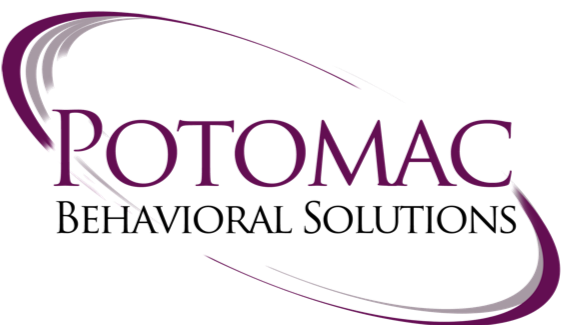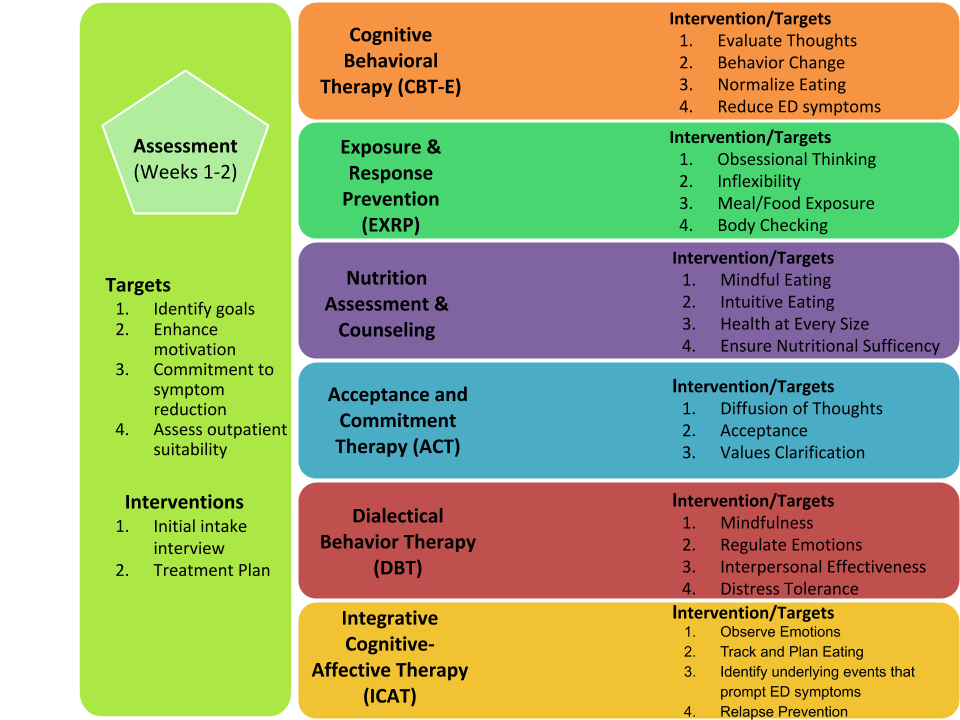Most eating disorders can be treated effectively in an outpatient setting when evidence-based interventions are utilized and a multidisciplinary team is available.
Our multi-disciplinary team of psychologists, registered dietitians and psychiatrists provide an ideal treatment team for eating and feeding disorders treatment.
> Learn more about our nutrition services
> Learn more about DBT for treating eating disorders
> Learn more about our medical teams expertise in managing the physical symptoms of eating disorders
TREATMENT PROGRAMS
ADULT EATING DISORDERS EVIDENCE BASED PROGRAM
Most adult patients in our Eating and Feeding Disorder Track are seen by a psychologist, registered dietitian, and psychiatrist or physician assistant.
Disorders in this track include:
Anorexia Nervosa
Bulimia Nervosa
Binge Eating Disorder
Avoidant Restrictive Food Intake Disorder (ARFID)
Unspecified Feeding and Eating Disorder (UFED)
Pica
Rumination Disorder
Other Specified Feed and Eating Disorder (OSFED)
Purging Disorder
Night Eating Syndrome
**Orthorexia
Body Dysmorphic Disorder
**"Although not formally recognized in the Diagnostic and Statistical Manual, awareness about orthorexia is on the rise. The term ‘orthorexia’ was coined in 1998 and means an obsession with proper or ‘healthful’ eating. Although being aware of and concerned with the nutritional quality of the food you eat isn’t a problem in and of itself, people with orthorexia become so fixated on so-called ‘healthy eating’ that they actually damage their own well-being." (National Eating Disorders Association)
EVIDENCE-BASED PROGRAM
Symptoms are targeted with evidence-based treatments. Our focus is most often to move patients away from rule-based eating (e.g., meal plans, diets, etc.) and instead help them to develop skills in Intuitive Eating. Many of our patients are discharging from "higher level of care" facilities, although most are seeking treatment for the first time.
A typical course of treatment in our evidence based treatment program
ICAT PROGRAM FOR BULIMIA AND BINGE EATING SYMPTOMS
ICAT is a 21-week treatment program that focuses on skill development for adults who have symptoms of Bulimia Nervosa (BN) and Binge Eating Disorder (BED). ICAT focuses on building a collaborative relationship between patient and provider with the goal of examining the correlation between emotions and binging/ purging behaviors.
Individuals who exhibit bulimic behaviors often experience:
Low Self-Esteem
Concerns About Shape/ Weight
Shame/ Guilt
Restrictive Dieting
Binging Behavior
Self-Induced Vomiting
Self-Induced Diarrhea
Excessive Exercise
Negative/ Low Affect
Interpersonal Stress
Of course, many individuals may find symptoms of their BN or BED effective in momentarily mitigating negative feelings and regulating their emotions.
However, these negative emotions often return following symptom relapse (ie. binging, purging).
GOALS OF ICAT
Observe and Identify Emotions
Recognize and Evaluate Factors That Increase Negative Emotion and Decrease Positive Emotion States
Examine Situations that Elicit Bulimic Behaviors
Learn Ways to Effectively Alter Responses to Triggering Emotion States
Learn How to Prevent Behavior Relapses
TREATMENT MODES
Individual Therapy
TREATMENT PROGRAM STRUCTURE (21-WEEK)
ICAT is structured across 4 phases, with a total of 21, 50-minute sessions. There will be 2 sessions weekly for the first month of treatment, after which sessions will continue weekly.
Phase 1 (Sessions 1-2)
Establish a treatment relationship with the provider as an effective and willing collaborator.
Phase 2 (Sessions 3-8)
Establish Treatment Goals
Monitor Food Intake
Meal Planning
Phase 3 (Sessions 9-19)
Continue to Monitor Emotions
Examine ineffective emotion-regulation skills
Examine ineffective interpersonal skills
Examine the differences between actual self and desired self
Examine how different situations can impact emotions
Promote acceptance of actual self
Address self-discrepancy
Phase 4 (Final 2-4 Sessions)
Review treatment progress
Review future treatment goals
Learn how to prevent behavior relapse
CHILD/ADOLESCENT EATING & FEEDING DISORDERS
Adolescents and young adults (including college-aged patients) with eating or feeding disorders are most effectively treated with family involvement. Our adolescent programming includes a multidisciplinary team and use of Maudsley Family Based Treatment (FBT) to aid in targeted resolution of eating disorder symptoms.
Disorders in this track include:
Anorexia Nervosa
Bulimia Nervosa
Binge Eating Disorder
Avoidant Restrictive Food Intake Disorder (ARFID)
Unspecified Feeding and Eating Disorder (UFED)
Pica
Rumination Disorder
Other Specified Feed and Eating Disorder (OSFED)
Purging Disorder
Night Eating Syndrome
**Orthorexia
Body Dysmorphic Disorder
**"Although not formally recognized in the Diagnostic and Statistical Manual, awareness about orthorexia is on the rise.
The term ‘orthorexia’ was coined in 1998 and means an obsession with proper or ‘healthful’ eating. Although being aware of and concerned with the nutritional quality of the food you eat isn’t a problem in and of itself, people with orthorexia become so fixated on so-called ‘healthy eating’ that they actually damage their own well-being." (National Eating Disorders Association)
A typical course of treatment in our evidence based treatment program
INTERESTED IN LEARNING MORE?
To request a consultation or inquire about treatment options, please contact us below. Please allow 24 hours for a response to your inquiry.



